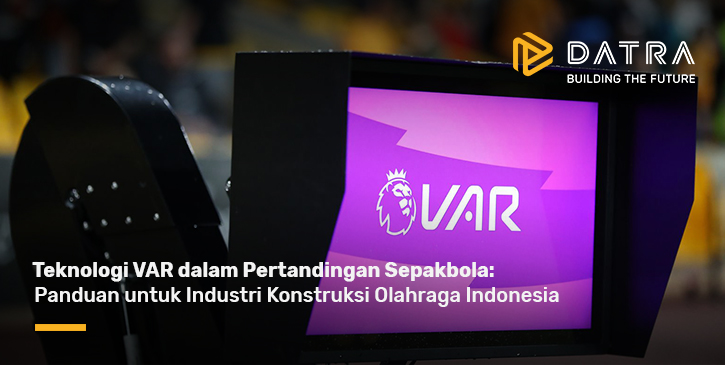VAR Technologies in Refereeing: Lessons for Indonesia's Sports Construction Industry
Stadium, Technology
March 13, 2023

As Indonesia prepares to host the FIFA Under 20 World Cup in 2023, the use of Video Assistant Referees (VAR) in football games is becoming increasingly relevant for architects and stadium operators. VAR is a technology-based system that assists referees in making more accurate and fair decisions in critical moments of the game, such as goals, penalties, red cards, and mistaken identity.
.%5B1%5D.jpg)
How VAR Works:
VAR involves a team of video match officials (VMOs) who review the footage of the game from different angles and communicate with the referee on the pitch via an earpiece and a monitor on the side of the pitch. The VAR system can be activated by the referee, the VMOs, or the VAR Hub at the International Football Association Board (IFAB).
VAR typically requires a range of devices and systems, including high-resolution cameras placed strategically around the stadium to capture multiple angles and views of the game, a video operations room (VOR) where the VMOs can watch the footage and communicate with the referee, a communication system that allows the VMOs to talk to the referee and alert them to potential mistakes, and a monitor on the side of the pitch where the referee can review the footage and make the final decision.
Benefits of VAR:
VAR has been praised for its ability to correct obvious mistakes, reduce human errors, increase transparency, and improve the integrity of the game. For example, VAR has been used to reverse incorrect offside decisions, award or cancel goals that were missed or wrongly awarded, rescind or confirm red cards, and detect fouls or handballs that were not seen by the referee.
.jpg)
Case Study:
One notable example of VAR's impact on a game was the 2019 UEFA Champions League quarterfinal match between Manchester City and Tottenham Hotspur. In the second leg of the match, City scored a late goal that would have sent them through to the semifinals on away goals. However, the goal was disallowed by VAR due to a handball by City's player in the buildup to the goal. The VAR review took several minutes, during which the fans and players were on edge, but ultimately the decision was upheld, and Tottenham advanced to the semifinals. This case illustrates how VAR can be a game-changer in critical moments of the game and how it can ensure better fairness and justice.
Challenges of VAR:
However, VAR has also been criticized for its potential to disrupt the flow of the game, create delays and confusion, undermine the authority of the referee, and generate controversy and debates. VAR can also be expensive to install, maintain, and operate, and may require significant technical and training resources.
Conclusion:
Despite these challenges, VAR is likely to become more prevalent in football and other sports in the future, as technology advances and the demand for fairness and accuracy increases. In Indonesia, where football is a popular and growing sport, architects and stadium operators should be aware of the potential benefits and risks of VAR and consider incorporating it into their design and operations. PT Datra Internusa, a leading sports construction company in Indonesia with decades of experience in building and renovating stadiums, can provide valuable insights and solutions for VAR implementation. Contact Datra at sales@datra.id to learn more.


